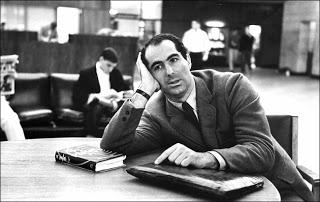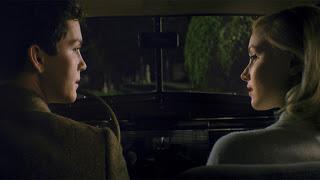 Philip Roth's novels have long frustrated filmmakers, who seem incapable of rendering his complex, neurotic world-building in cinematic terms. Adapting provocative best-sellers like Portnoy's Complaint and The Human Stain sounds like a good idea, until you realize that what makes Roth's writing memorable (a combustible mixture of Jewish angst, sexual hang-ups and incisive symbolism) doesn't easily translate to cinema. Which hasn't stopped directors with incurable hubris from trying.
Philip Roth's novels have long frustrated filmmakers, who seem incapable of rendering his complex, neurotic world-building in cinematic terms. Adapting provocative best-sellers like Portnoy's Complaint and The Human Stain sounds like a good idea, until you realize that what makes Roth's writing memorable (a combustible mixture of Jewish angst, sexual hang-ups and incisive symbolism) doesn't easily translate to cinema. Which hasn't stopped directors with incurable hubris from trying.Last year saw two separate Roth adaptations. One, American Pastoral tackled one of his best-known works (which earned Roth a Pulitzer, among other awards); the other, Indignation, a late-career novella that's relatively obscure. Side-by-side, they offer an instructive course on how to (and how not to) adapt literature for the screen.
American Pastoral (2016, Ewan McGregor)
 Ewan McGregor's take on American Pastoral (2016) suffers from shortcomings hardly exclusive to Roth adaptations. It's a well-meaning, reasonably faithful to the source, yet lacks the novel's power, drive and voice. Considering the book, how could it not?
Ewan McGregor's take on American Pastoral (2016) suffers from shortcomings hardly exclusive to Roth adaptations. It's a well-meaning, reasonably faithful to the source, yet lacks the novel's power, drive and voice. Considering the book, how could it not?Swede Lvov (Ewan McGregor) is a Jewish-American athlete who marries beauty queen Dawn (Jennifer Connelly), raises precocious daughter Merry (Dakota Fanning) and runs a glove factory in Newark, positing himself as an all-American success story. Yet there's tension running beneath the surface of the Lvov's idyllic existence, exploded by Merry's turn to radical politics in the '60s. Merry's implicated in an act of terrorism that forces Swede into a reckoning with his own complacency, wondering where things went wrong.
There's nothing inherently uncinematic in that story, but first-time director McGregor misses the mark. While Pastoral occasionally boasts striking visuals of New Jersey farmland and urban decay, more often the staging is pedestrian and obvious. There's little attempt to evoke place or period, with major scenes filmed in Pittsburgh rather than Newark and copious use of stock footage in place of recreations. The exception is a tepid restaging of the Newark race riots, restricted to long shots of police beatings and a bullet crashing through Swede's widow.
In fairness to McGregor, even an experienced director would stumble over the material. Roth establishes Pastoral's characters as symbolic archetypes, which he ruthlessly deconstructs: Swede, a Jew so eager to assimilate into Gentile society that he forgets his roots and lacks authenticity; Dawn, whose resentment over being dismissed as a rich bimbo drives her mad; and Merry, a stammering stand-in for Boomer confusion. Roth benefits from literature's conventions, which let him sketch in backstories and resentments through interior monologues and exposition. McGregor, as a filmmaker, doesn't have that luxury, even if he borrows Roth's avatar Nathan Zuckerman (David Strathairn) as narrator.
So American Pastoral, like many a failed adaptation, settles for a Cliff Notes rendering of its source. Without Roth's cutting explication of Swede's inner doubts, only his square surface registers: McGregor's earnest performance makes him likable but insubstantial. Jennifer Connelly fares even worse; shorn of her backstory, Dawn becomes merely hysterical. Dakota Fanning invests Merry with caustic, cynical energy, but the character's so broadly rendered she's never really convincing. Then there's Valorie Curry, as a radical temptress whose equivocal role amounts to dispensing exposition.
American Pastoral's virtues are in the margins: Martin Ruhe's occasionally handsome photography, engaging supporting turns from Peter Liegert as a very Jewish dad and Uzo Aduba as Swede's dogged assistant, an understandable reverence towards the source material. Even so, McGregor can't offer anything more than a broad, self-important rendering of Roth's masterwork. That the central bombing climaxes with a close-up of a billowing American flag embodies everything wrong with the picture.
Indignation (2016, James Schamus)
 In welcome contrast, Indignation (2016) gets nearly everything right. Perhaps having one of Roth's slimmer novels helps, allowing writer-director James Schamus to bore in on the compelling character drama at its core.
In welcome contrast, Indignation (2016) gets nearly everything right. Perhaps having one of Roth's slimmer novels helps, allowing writer-director James Schamus to bore in on the compelling character drama at its core.Marcus Messner (Logan Lerman) is one of the few Jewish students at a small Ohio college in the early '50s. His striving, independent personality marks him as an outsider, while his atheist beliefs cause him to butt heads with Gentile students, fellow Jews and the officious Dean (Tracy Letts) alike. He starts a furtive romance with Olivia Coleman (Sarah Gadon), whose rich background belies a troubled past. The longer Marcus remains at school, the more of an outsider he becomes - and the more complicated his relationship with Olivia gets.
Indignation is rich with Roth's usual obsessions, albeit in more austere, restrained form than his standard work. Marcus quotes Bertrand Russell and argues with professors but is baffled by Olivia's sexual eagerness; yet he also rankles at domineering parents (Danny Burstein and Linda Emond), who don't wish him to grow up. His struggles to forge an independent identity clash with over-friendly classmates, baffled by his reluctance to join fraternities, and the Dean, who complains about moral laxity and student waywardness. There's no way for Marcus to square these competing influences; whatever decisions he makes marks him an outsider somewhere.
Despite its modest trappings, Indignation does a far better job evoking a period than American Pastoral. Winesburg's small-town repression provides impetus to Marcus's iconoclasm and Olivia's hidden turmoil. If anything she's far richer than Roth's original, who gives hospital hand jobs while leaving her backstory to our imagination: Schamus instead focuses on her forced normalcy, acting like the well-mannered WASP everyone expects. The movie's better, too, for not making Big Statements about the Fifties; despite offhand references to McCarthyism and bookends depicting the Korean War, most of the social pressures are internalized.
The central scene shows Marcus meeting the Dean, who probes into his personal life while hammering in a message of jovial conformity. His subtle anti-Semitism (insistently identifying Marcus's dad as a kosher butcher) and friendly bullying (badgering Marcus to join the baseball team) embodies everything detestable about social pressures: Marcus isn't targeted for a specific belief so much as being an individual, verboten in the Eisenhower era. This scene's complemented by a later confrontation with Marcus's mother, who tries emotional blackmail to drive Marcus from Olivia. Regardless of culture, adults controlling their children can only lead to grief.
Logan Lerman does excellent work rendering Marcus's arrogance, confusion and resentment, certain only in his uncertainty. Aside from The Perks of Being a Wallflower, Lerman's rarely had a chance to stretch his dramatic chops and he rises to the occasion. Sarah Gadon makes Olivia appealing vulnerable without shading over her inner turmoil; Tracy Letts, Danny Burstein and Linda Emond play all manner of interfering adults.
There are numerous other Roth adaptations to revisit, but as previously indicated, few with very good reputations. Perhaps we shall continue this literary inquest in future reviews.

